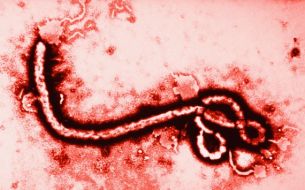After Ebola arrives in Texas, the Catholic faithful are being asked to avoid kissing or shaking hands in church

The Diocese of Fort Worth in Texas has issued new guidelines for churches following the arrival of Ebola in nearby Dallas.
The guidelines are similar to those distributed during flu season but have been reworked in light of "questions regarding communicable diseases, such as Ebola".
"Please begin utilizing these adaptations immediately", the memo reads.
The precautions recommended in the document include encouraging the faithful not to hold hands during the reciting of the Our Father, and to receive Holy Communion in their hands and not on their tongue.
Churchgoers are also asked not to share the Sign of the Peace by touching hands or kissing.
"This can be done with meaningful eye contact, smiles, and a bow of the head in reverence to one another," the guidelines suggest.
Furthermore the Precious Blood is not to be distributed to the faithful during Mass.
"Let us continue to pray for our communities and the families that are affected by influenza and other communicable diseases," the memo concludes.
Two nurses in Dallas contracted Ebola while treating Thomas Eric Duncan, who died from the virus on October 8, at the city's Presbyterian Hospital.
Nina Pham was transferred to a state of the art facility at the National Institutes of Health in Bethesda, Maryland, on Thursday.
USA Today reports she said: "I'm so thankful for the outpouring of love and support from friends and family, my coworkers and complete strangers. I feel very blessed and have gained strength from their suppor.
"I'm doing really well thanks to this team, which is the best in the world. I believe in my talented coworkers.''
The second nurse infected at the Dallas hospital, Amber Vinson, has also been transferred out of the city to Emory University Hospital for treatment.
Dallas Presbyterian has since issued an apology over its handling of Mr Duncan.
"Unfortunately, in our initial treatment of Mr Duncan, despite our best intentions and a highly skilled medical team, we made mistakes," the hospital's Dr Daniel Varga said in an official statement.
"We did not correctly diagnose his symptoms as those of Ebola. We are deeply sorry."











